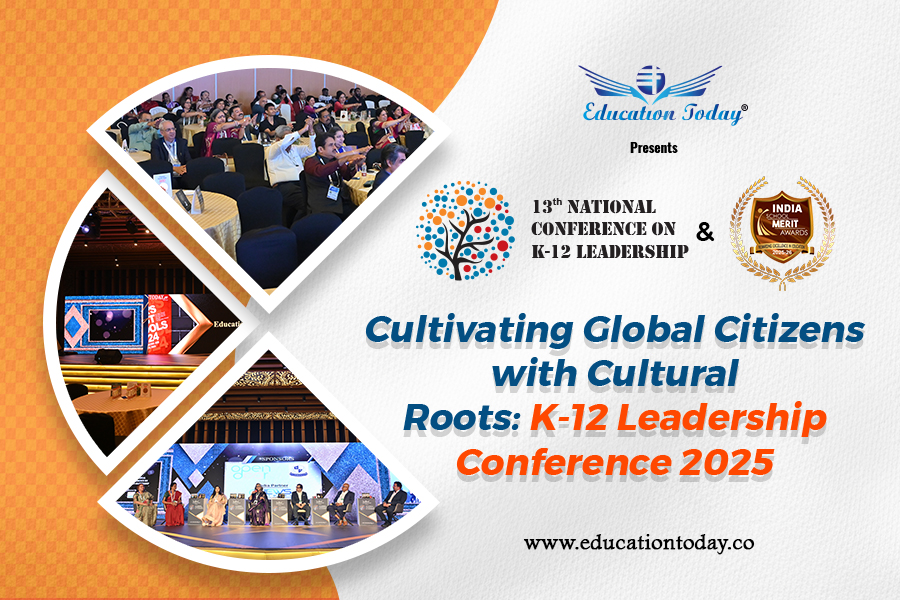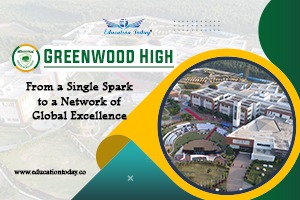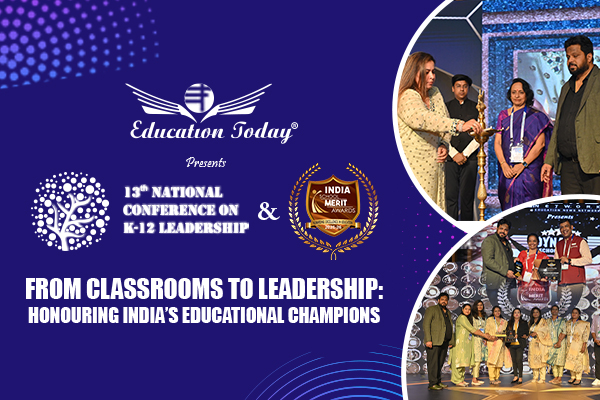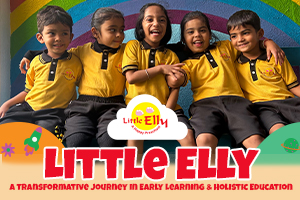Education Summit 2024 Highlights AI, STEM & EdTech Innovations in K-12 Learning
What happens when innovation walks into a classroom? It doesn’t just change the lesson plan—it rewrites the entire learning experience.This spirit of transformation was at the core of the North Educators’ Summit and North School Merit Awards 2024, held on August 30 at The Crowne Plaza, Gurugram. The event brought together a vibrant mix of school leaders, education consultants, and thought influencers across North India to explore what’s next in K-12 education.
A summit highlight was a thought-provoking panel discussion that dug deep into the evolving role of technology in today’s classrooms. From the rise of AI-powered learning tools and robotics labs to the growing momentum around STEM-based education, the conversation spotlighted how innovation is not just supporting education—it’s revolutionizing it.
Panelists shared real-world examples and practical insights on how technology personalizes learning experiences, builds critical thinking through experiential tools, and empowers educators to move beyond conventional teaching methods. They also addressed themes like digital equity, tech-readiness among teachers, and balancing screen time with meaningful engagement.
More than just a discussion, it was a call to action for educators and institutions to embrace purposeful innovation. As the panel made clear, the schools ready to adapt and lead with technology today are the ones equipping students for a future that’s fast, fluid, and full of possibility.
Dr. Ritu Dewan highlighted the disparities between rural and urban schools in terms of access to technology. She suggested solutions like providing rental tech tools or allowing students to use school resources after school hours. She also pointed out the cost challenges in K-12 education technology integration and the need for schools to effectively prioritize their capital allocation to meet digital needs. Additionally, she underscored the importance of having strong IT coordinators to manage technological issues and ensure smooth integration.
Dr. Neelima Kamrah discussed the shift in education brought on by the COVID-19 pandemic, which accelerated the adoption of online learning and skill-based curricula. She explained how AI tools in classrooms have made abstract concepts more tangible and engaging, transforming the learning experience. Dr. Kamrah emphasized that students and teachers must be tech-savvy to take full advantage of modern educational tools.
Sharmila Chatterjee spoke passionately about the role of robotics in education. She argued that robotics represents the highest level of technology integration in the classroom, enhancing students' learning experiences and preparing them for a tech-driven future. She acknowledged that while the cost of STEM education initiatives can be a barrier, schools with the proper planning and resources can overcome these challenges and provide cutting-edge educational experiences.
Dr. Dhirendra Singh raised concerns about data privacy and education security. As more schools incorporate digital tools, ensuring the security of student data becomes crucial. He called for strong encryption and clear guidelines on data access within school systems to protect students' digital footprints.
Aparna Magee closed the discussion by emphasizing the pivotal moment in education. She noted that technology empowers students unprecedentedly, particularly through gamification and biometric technology, such as facial recognition, to assess student engagement. She stressed that education must evolve to meet the needs of future generations and equip students for success in an increasingly digital world.
Equitable access to education was at the forefront of discussions, and the summit emphasized the collective responsibility of all stakeholders—educators, parents, policymakers, and tech innovators—to ensure that every student receives a high-quality education that prepares them for a rapidly changing world.
As India continues to advance its educational landscape, events like the North Educators’ Summit play a crucial role in fostering collaboration, sharing insights, and driving forward the vision of a future-ready education system that is inclusive, innovative, and aligned with the needs of tomorrow's learners.
A summit highlight was a thought-provoking panel discussion that dug deep into the evolving role of technology in today’s classrooms. From the rise of AI-powered learning tools and robotics labs to the growing momentum around STEM-based education, the conversation spotlighted how innovation is not just supporting education—it’s revolutionizing it.
Panelists shared real-world examples and practical insights on how technology personalizes learning experiences, builds critical thinking through experiential tools, and empowers educators to move beyond conventional teaching methods. They also addressed themes like digital equity, tech-readiness among teachers, and balancing screen time with meaningful engagement.
More than just a discussion, it was a call to action for educators and institutions to embrace purposeful innovation. As the panel made clear, the schools ready to adapt and lead with technology today are the ones equipping students for a future that’s fast, fluid, and full of possibility.
Tech Integration and Teacher Upskilling
A key highlight of the event was the panel discussion on "Use of Tech Tools, Innovative Technologies & Robotics in Modern K-12 Education." Chaired by Ms. Meeta Sharma, Principal of Mussoorie International School, the session brought together thought leaders such as:- Dr. Neelima Kamrah, Principal of KIIT World School, Gurgaon
- Dr. Dhirendra Singh, Principal of Birla School, Pilani, Rajasthan
- Aparna Magee, Director-Principal of Manav Rachna International School
- Srinivasan Sriram, Principal of The Mann School
- Dr. Ritu Dewan, Principal of Dayawati Modi Academy
- Sharmila Chatterjee, Principal of Billabong High International School
Key Insights from the Panelists
Srinivasan Sriram emphasized the need for teachers to be digitally literate, particularly given that Gen Z and Gen Alpha are digital natives. He stressed the importance of integrating digital literacy into every subject, not just computer science, and called for a digital-first approach in the curriculum. Infrastructure, access to technology, and EdTech tools are crucial for fostering an environment of personalized, interactive learning.Dr. Ritu Dewan highlighted the disparities between rural and urban schools in terms of access to technology. She suggested solutions like providing rental tech tools or allowing students to use school resources after school hours. She also pointed out the cost challenges in K-12 education technology integration and the need for schools to effectively prioritize their capital allocation to meet digital needs. Additionally, she underscored the importance of having strong IT coordinators to manage technological issues and ensure smooth integration.
Dr. Neelima Kamrah discussed the shift in education brought on by the COVID-19 pandemic, which accelerated the adoption of online learning and skill-based curricula. She explained how AI tools in classrooms have made abstract concepts more tangible and engaging, transforming the learning experience. Dr. Kamrah emphasized that students and teachers must be tech-savvy to take full advantage of modern educational tools.
Sharmila Chatterjee spoke passionately about the role of robotics in education. She argued that robotics represents the highest level of technology integration in the classroom, enhancing students' learning experiences and preparing them for a tech-driven future. She acknowledged that while the cost of STEM education initiatives can be a barrier, schools with the proper planning and resources can overcome these challenges and provide cutting-edge educational experiences.
Dr. Dhirendra Singh raised concerns about data privacy and education security. As more schools incorporate digital tools, ensuring the security of student data becomes crucial. He called for strong encryption and clear guidelines on data access within school systems to protect students' digital footprints.
Aparna Magee closed the discussion by emphasizing the pivotal moment in education. She noted that technology empowers students unprecedentedly, particularly through gamification and biometric technology, such as facial recognition, to assess student engagement. She stressed that education must evolve to meet the needs of future generations and equip students for success in an increasingly digital world.
The Way Forward: Embracing Innovation
The North Educators’ Summit 2024 served as an essential platform for discussing the future of K -12 education technology integration and the role of innovative teaching practices in shaping the next generation of learners. The event highlighted the importance of teacher upskilling, STEM education initiatives, and cutting-edge technologies like robotics and AI tools in classrooms to create a more engaging, personalized, and tech-driven learning environment.Equitable access to education was at the forefront of discussions, and the summit emphasized the collective responsibility of all stakeholders—educators, parents, policymakers, and tech innovators—to ensure that every student receives a high-quality education that prepares them for a rapidly changing world.
As India continues to advance its educational landscape, events like the North Educators’ Summit play a crucial role in fostering collaboration, sharing insights, and driving forward the vision of a future-ready education system that is inclusive, innovative, and aligned with the needs of tomorrow's learners.






